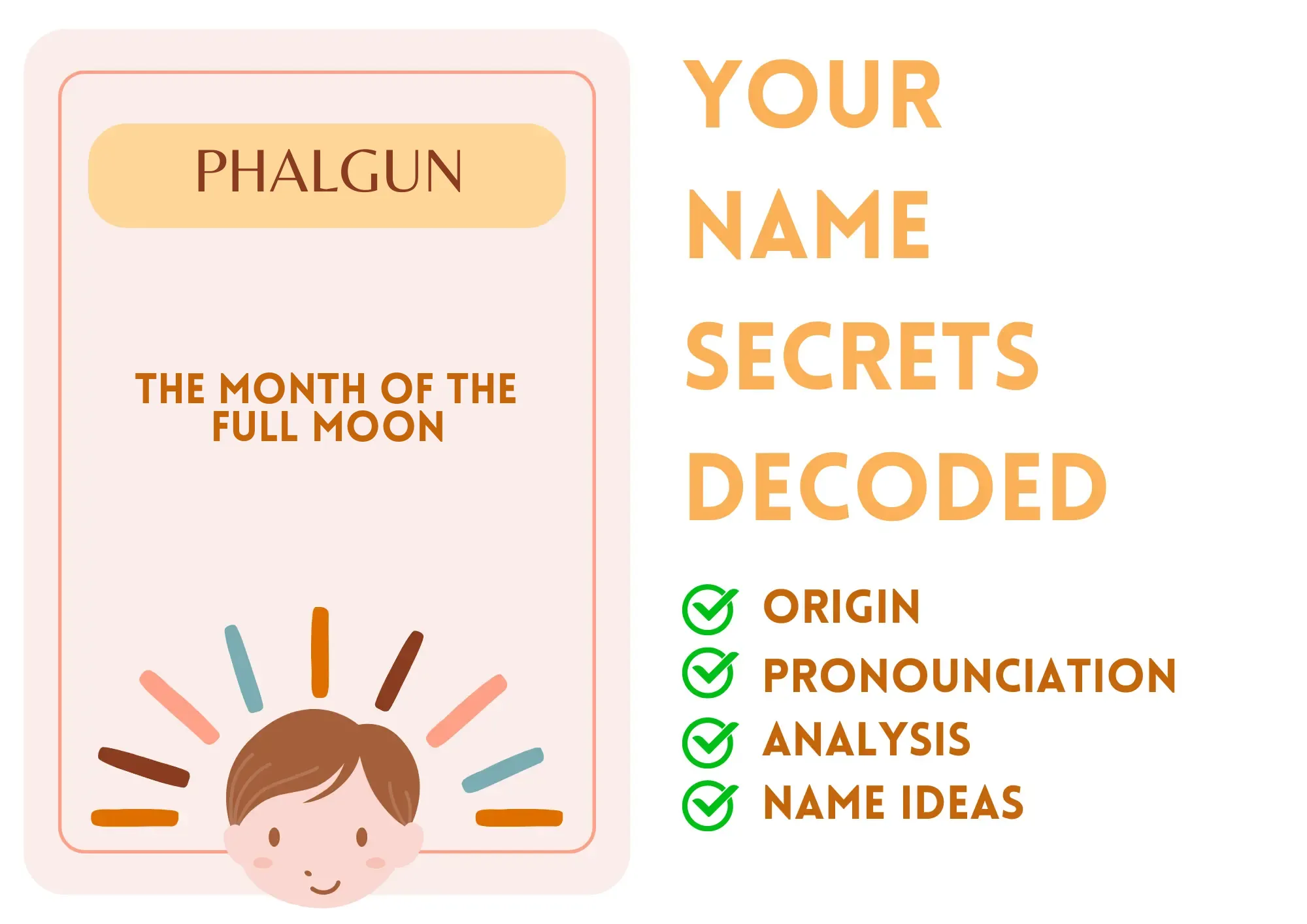
Phalgun
Phalgun is a culturally significant name of Sanskrit origin that translates to 'the month of the full moon' and is associated with the Hindu lunar calendar. Popular in India, the name is predominantly male, often given to boys born in or around the month of Phalgun, which typically falls between February and March. The month is special as it signifies the transition of winter to spring, symbolizing renewal and celebration.
The name Phalgun carries religious significance in Hinduism, as it is linked to various festivals such as Holi, which celebrates colors, love, and the arrival of spring. The name is appreciated for its deep-rooted cultural meaning that embodies joy, beauty, and new beginnings.
Phalgun is generally perceived positively, evoking feelings of happiness and celebration. It is simple to write and pronounce, though some might find it less common. Common nicknames include Phal and Gun.
While less frequently featured in popular culture, Phalgun embodies themes of joy and renewal prevalent in Indian literature and folklore, often reflected in poetry about nature and festivities.
Basic Information
Gender: Boy
Sounds Like: PHUL-goon
Pronunciation Explanation: The emphasis is on the first syllable 'PHUL', pronounced as 'ph' with a soft 'ul' sound, followed by a soft 'goon.'
Summary and Meaning
Meaning: the month of the full moon
Origin: The name Phalgun has Indian origins, being deeply rooted in Hindu culture and the Sanskrit language.
Usage: Phalgun is traditionally a masculine name but could potentially be used in a unisex context, though this is rare.
Name Number (Chaldean)
Name Number (Pythagorean)
Name Constellation (Nakshatra)
Name Zodiac Sign (Rashi)
Popularity (Global Rank)
Overall: 81619
Boys: 72681
Most Popular in
Religious and Cultural Significance
Religion: Hindu
Background: In Hindu culture, Phalgun is significant, representing a month filled with cultural festivities, primarily linked with the celebration of Holi.
Cultural Significance: Phalgun symbolizes renewal, joy, and the celebration of life; it is often chosen for boys born during this festive period.
Historical Significance: Phalgun carries historical importance in the Hindu calendar, marking seasonal changes and linked to traditional festivals that celebrate vibrancy and new life.
Popular Culture
Literature and Mythology: The name Phalgun may appear in classical Indian poetry and stories celebrating spring and the associated festivities.
Movies and Television: It is less commonly represented in mainstream media but may be found in regional cinema pertaining to cultural themes.
Feelings and Perceptions
Perception: Phalgun tends to be perceived as a unique and culturally rich name. It carries connotations of joy, beauty, and the transient nature of time with the changing seasons.
Positive Feelings: Unique, celebratory, joyful, vibrant, culturally rich, connected to nature.
Negative Feelings: Some may consider it unique to the extent of unfamiliarity, which could lead to mispronunciation.
Practical Considerations
Ease of Writing and Calling: The name Phalgun is moderately easy to write and pronounce, consisting of seven letters and two syllables, making it relatively straightforward in everyday use.
Common Typos and Misspellings: Phalgun,Phalgun,Falgun,Phalgon
Common Nicknames: Phal,Gun,Phali
Phalgun Popularity
Phalgun Usage and Popularity By Country
| Country | Rank (Overall) |
|---|---|
| Iraq | 12134 |
| Oman | 12466 |
| India | 19253 |
| Germany | 31516 |
| United Arab Emirates | 67985 |
| Australia | 68209 |
| Netherlands | 70785 |
| United States | 74720 |
| Canada | 96992 |
Phalgun Usage and Popularity By City
| City | Rank (Overall) |
|---|---|
| Bengaluru | 6621 |
| HyderÄbÄd | 8396 |
| Bombay | 16299 |
| Visakhapatnam | 3790 |
| Alwar | 1259 |
| Thane | 7041 |
| Towson | 573 |
| New Delhi | 18092 |
| New York | 52406 |
| Munich | 6581 |
Compatibility Analysis
Famous Persons Named Phalgun
No results found for Phalgun.
Related Names
Similar Sounding Names:
Falgun,Balgun,Pahlavan,Palgun